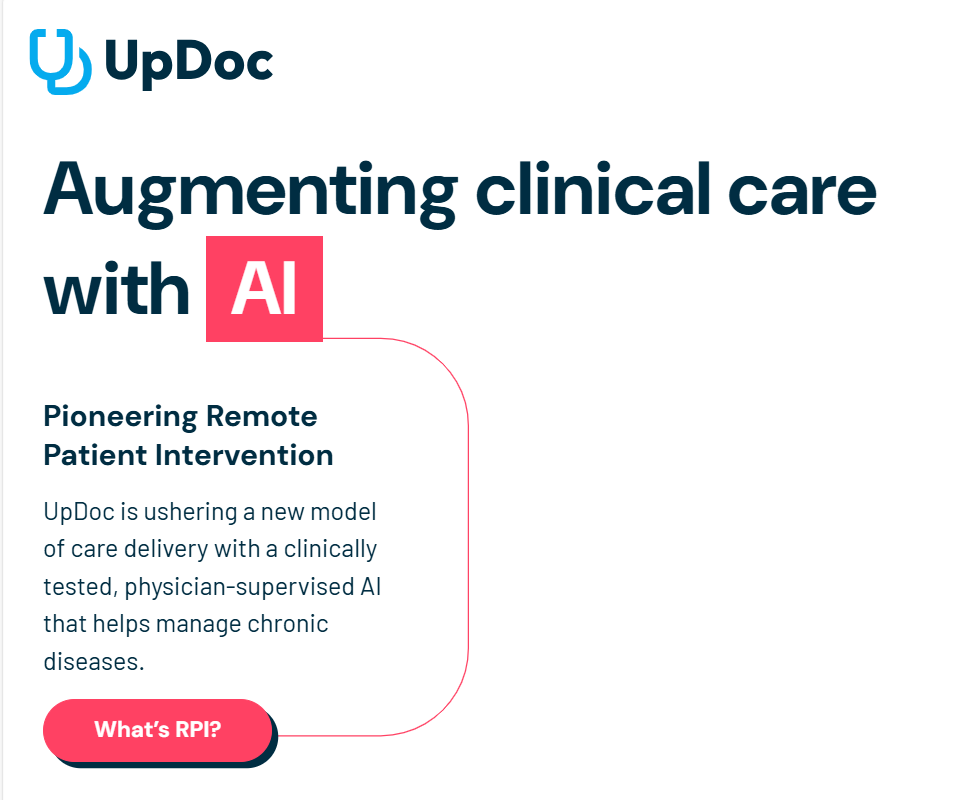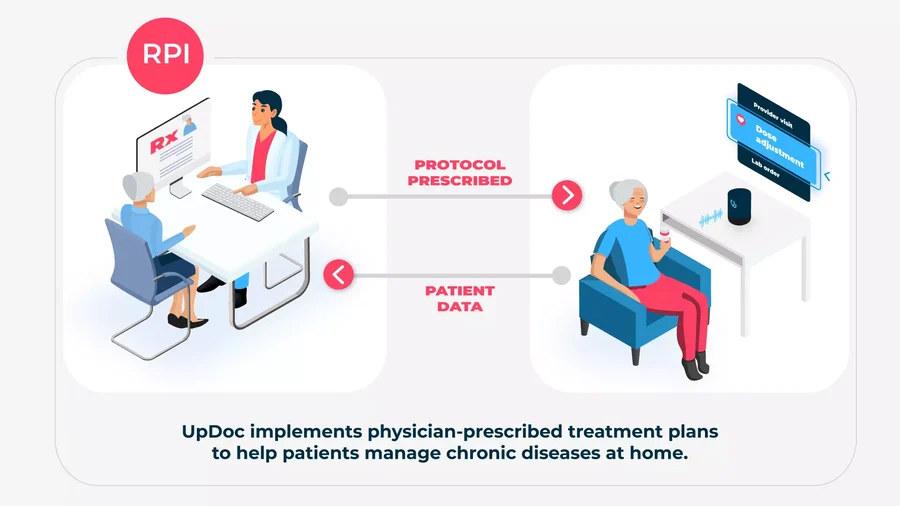- AIHealthTech Insider
- Posts
- AI Slashes Cancer Wait Times 80%!- Issue #2
AI Slashes Cancer Wait Times 80%!- Issue #2
Plus:Robots Become Surgeons: Free AI Training Platform for Minimally Invasive Surgery
Welcome to the second issue of AIHealthTech Insider
In this issue learn how AI creates personalized cancer treatments, trains surgical robots, and revolutionizes sepsis detection. Discover UpDoc's AI for chronic care and virtual rat models for disease research. Understand AI's role in improving heart failure treatment.
Stay tuned for more updates and exciting developments in the world of AI and healthcare!
AI in Healthcare News 🩺
Beat Cancer Faster: AI Creates Personalized Treatment Plans in Minutes

Source: openai.com
Color Health, in collaboration with OpenAI, has introduced an AI-powered copilot application using GPT-4o to revolutionize cancer care. This innovative tool integrates patient data with clinical guidelines to create personalized treatment plans, helping healthcare providers make evidence-based decisions swiftly. By identifying missing diagnostics and generating comprehensive workup plans, the copilot significantly reduces time to treatment.
Key Features:
Personalized Plans: Tailors treatment plans based on individual patient data.
Efficient Diagnostics: Quickly identifies missing labs, imaging, and pathology results.
Clinician-In-The-Loop: Ensures all AI-generated outputs are reviewed by a clinician.
HIPAA-Compliant: Maintains patient privacy and data security.
How It Works: The copilot extracts and normalizes patient information, answers key questions to identify missing diagnostics, and generates necessary documentation for diagnostic workups. Clinicians review and refine the AI-generated plans, ensuring accuracy and safety before adding them to the patient's treatment plan. This innovative approach streamlines cancer care, enhancing efficiency and reducing delays.

Robots Become Surgeons: Free AI Training Platform for Minimally Invasive Surgery
A collaboration between NVIDIA and academic researchers has developed ORBIT-Surgical, a simulation framework using NVIDIA Isaac Sim and Omniverse to train surgical robots with high precision and efficiency. This framework supports various laparoscopic maneuvers, enhancing robotic skills while reducing surgeons' cognitive load.

Source: blogs.nvidia.com
By using reinforcement and imitation learning, the digital twin of the da Vinci Research Kit robot was trained in under two hours on a single NVIDIA RTX GPU, demonstrating effective transfer to physical robots.
Key Features:
Laparoscopic Maneuvers: Supports over a dozen precise surgical tasks.
GPU Acceleration: Utilizes NVIDIA RTX GPUs for fast, efficient training.
Reinforcement & Imitation Learning: Mimics expert surgical techniques.
Photorealistic Rendering: Enabled by NVIDIA Omniverse for high-fidelity simulation.
Implications in Healthcare:ORBIT-Surgical significantly enhances the precision and efficiency of surgical training for robots, reducing cognitive load on surgeons by augmenting their skills. It generates high-fidelity synthetic data cost-effectively, minimizing reliance on expensive real-world datasets, and improves AI model accuracy for tasks like surgical tool segmentation, leading to better overall surgical outcomes.

Early Sepsis Detection with AI: Revolutionary AI blood test for faster, targeted treatment
Sepsis is a serious medical condition where the body's response to infection goes into overdrive, causing inflammation and potentially leading to organ failure. Early diagnosis is crucial for effective treatment, but current methods can be slow.
Here's some exciting news: Researchers are developing an AI-powered blood test that could revolutionize sepsis diagnosis.

Image created with DALL-E 3
How it Works:
This innovative test analyzes a patient's bacterial makeup directly from a blood sample. Unlike traditional methods that take days, it uses AI and machine learning to quickly predict the most effective antibiotics.
Faster diagnosis enables quicker, targeted treatment, improving patient outcomes and reducing complications. The AI system continually learns, making it a powerful tool against evolving bacterial threats, though further studies are needed.
Learn AI in 5 Minutes a Day
AI Tool Report is one of the fastest-growing and most respected newsletters in the world, with over 550,000 readers from companies like OpenAI, Nvidia, Meta, Microsoft, and more.
Our research team spends hundreds of hours a week summarizing the latest news, and finding you the best opportunities to save time and earn more using AI.
AI Breakthroughs & Innovations 🔬
Virtual Rats for Research: Understanding movement and disease with AI
Abstract: Scientists have created a breakthrough virtual rat model with an artificial brain, mimicking real rat movement with incredible accuracy. This paves the way for a new era of "virtual neuroscience," offering exciting implications for healthcare research.
This research by Harvard and Google DeepMind addresses this challenge by creating a biomechanically realistic digital rat model.

Source: harvard.edu
Key Techniques:
High-resolution data from real rats: This data was used to train an artificial neural network (ANN) within the virtual model.
MuJoCo physics simulator: This simulated gravity and other physical forces, allowing the virtual rat to move realistically.
Motor Imitation and Control (MIMIC) pipeline: This pipeline trained the ANN on rat behavior, enabling it to mimic real-world movements.
Implications for Healthcare Research:
The virtual rat aids in studying brain control of movement, offering insights into diseases like Parkinson's and stroke. It simulates disease impacts on neural circuits, aiding drug discovery and treatment. Analyzing its behavior enhances understanding of real animal navigation, potentially revolutionizing our knowledge of movement, disease, and the brain, and advancing healthcare.
The findings were published in the journal Nature
AI Tools and Technologies 🛠️
UpDoc’s AI for Chronic Care: Enhanced healthcare delivery through AI partnerships.
UpDoc is transforming patient care with its conversational AI technology, developed in partnership with Microsoft, Google, UCSF Health, and others. The AI leverages advanced language models to autonomously manage chronic diseases, significantly improving patient outcomes.
Validated at Stanford Medicine, the AI has shown an 81% success rate in managing diabetes, enhancing medication adherence, and reducing the need for frequent doctor visits.

Source: updoc.ai
Implications for Chronic Care
UpDoc’s AI innovation aims to revolutionize chronic care by offering high-quality, affordable healthcare, particularly in underserved areas. It enhances physician encounters, improves medication management, and aids in disease prevention, potentially boosting patient health and reducing costs.

Source: updoc.ai
from the archives 📁
AI for Heart Failure: Improved risk predictions and treatments.
UCL researchers used AI to classify heart failure into five subtypes, improving patient risk predictions and treatments. Analyzing data from 300,000 patients, the study found distinct mortality risks for each subtype.
Subtypes & Risks:
|  Image created with DALL-E 3 |
An AI-powered app helps clinicians predict patient risks. Supported by BigData@Heart, this research aims to enhance heart failure care.
For more details, visit Lancet Digital Health.
Podcast Spotlight 🎙️
Impact of AI in Cardiovascular Disease Management
Ramin Mousavi, CEO of CathWorks, joins Ramesh Dontha to discuss the FFRangio System, an AI-powered tool that analyzes angiograms to help doctors make life-saving decisions.
Dive deep with them as they explore:
The beating heart of CathWorks — what fuels their passion for innovation?
How AI is reshaping cardiovascular care, one beat at a time.
The ups and downs of building a successful healthcare startup.
Ramin’s inspiring journey of grit and ambition.
Get ready to unlock the future of healthcare!
Stay tuned for future newsletters where we explore even more innovative healthcare advancements!



